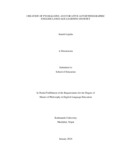
Please use this identifier to cite or link to this item:
https://hdl.handle.net/20.500.14301/369| Title: | Creation of Pygmalions: An Evocative Autoethnographic English Language Learning Journey |
| Authors: | Lepcha, Jonash |
| Citation: | Lepcha, J.(2024). Creation of pygmalions: An evocative autoethnographic English language learning journey. |
| Issue Date: | Jan-2024 |
| Publisher: | Kathmandu University School of Education |
| School: | SOED |
| Department: | DOLE |
| Level: | M.Phil. |
| Program: | Master of Philosophy (MPhil) in English Language Education |
| Abstract: | English language learning has been widely researched as second/foreign language (S/FL) in Nepal and India or generally in those countries whose first language (FL) is not English. In my inquiry I have explored my intimate English language learning lived experiences to unearth the knowledge unexplored until today from a learner’s experiences. I have focused on the schooling bittersweet experiences and a few English language learning and teaching experiences which have left indelible pictures, experiences and memories as its learner and teacher. The main objective of this inquiry is to retell as a researcher-participant my own lived experiences as a Lepcha speaker to show that contextualised teaching and learning would have saved two or three other languages. Here, by contextualised, I mean the people, relationships, socio-cultural beliefs and practices and the linguistic background of the learners. The purpose of this inquiry was to consciously explore the transformations I have gone through as an English language learner and now its teacher. In addition to exploring, it was also telling, retrospecting, and interpreting the lived experiences of a learner whose language completely differed in alphabets, script, reading, writing, listening and speaking. I honestly tried to unveil the information, meaning and knowledge hidden in my English language learning journey that they not only evoked my past interconnected emotions but also enlightened me to find myself in becoming. I am sure the emotions intertwined with lived experiences and memories would resonate and relate with the life experiences of my readers who are learning English as their second or third language. It is also an expectation that ELT researchers who engaged or will be engaging intimately in researching to record the lived life experiences may be helped even if it is only for reading sake. Meanwhile, writing as inquiring in the autoethnographic inquiry allowed me to communicate this transformative and empowering aspect of storytelling. As such, I adopted the multi-paradigmatic research approach to understand the multifaceted learning techniques and styles a learner like me generally adopt to learn this language. The postmodernism, interpretivism and criticalism were used as vehicles of not only expressing my English language learning but also to analyse, critique and construct knowledge that were taken for granted by educational institutions and ELT practices. I have used transformative theory of learning to interpret the learning as transformation that I have undergone – personally, professionally and pedagogically – as English as a second language learner and a teacher. In addition, I have the socio-cultural theory, in narrating my English language learning experiences because language learning is not something outside of our society, culture and people rather than within. These two theories enabled me to delve into not only my English language learning lived experiences, emotions, but myself. Although not exclusively, the autoethnographic research method and the two language learning theories as method and theoretical referents highlight the significant stories of my English language learning and practices. The inquiry thus envisions English language learning and teaching without side lining the local context and language of the people. It neither belittles English language nor it kills other local languages/s creating multilingual school or classroom or education. And this needs ELT theorists, practitioners and language teachers to develop and meanwhile transform the existing policy, curriculum, pedagogy and teaching and learning strategies and techniques. And to fulfil this need, regular and rigorous yet practical and continuous teachers’ professional development courses in and through regular self reflective practices, conferences, seminars, and webinars must be organised and participated. Through this research study, therefore, I strongly believe and open the door for further research on this localised or contextualised ELT teaching and learning especially in relation to indigenous languages and other discourses related to it. The recommendation of the study is that English language teaching and learning requires to be inclusive than exclusive especially when dealing with the speakers of other languages – and this certainly expects conscious glocal curriculum and pedagogies. |
| URI: | https://hdl.handle.net/20.500.14301/369 |
| Appears in Collections: | Dissertation |
Files in This Item:
| File | Description | Size | Format | |
|---|---|---|---|---|
| Jonash Lepcha (Print). 14.04.2024. Creation of Pygmalions - An Evocative Autoethnographic English Language Learning Journey.pdf | 1.66 MB | Adobe PDF |  View/Open |
Items in DSpace are protected by copyright, with all rights reserved, unless otherwise indicated.